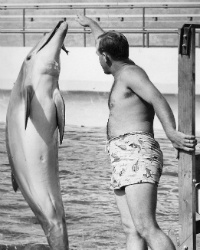A Career That Left Its Mark
 In areas as diverse as desert ecology and marine biology, Professor Norris made significant scientific contributions throughout his long research career. As a researcher at UCLA and UCSC, Norris mainly studied cetaceans (whales and dolphins). His ground-breaking discovery of echolocation in Spinner Dolphins revolutionized our understanding of the social dynamics of these remarkable animals.
In areas as diverse as desert ecology and marine biology, Professor Norris made significant scientific contributions throughout his long research career. As a researcher at UCLA and UCSC, Norris mainly studied cetaceans (whales and dolphins). His ground-breaking discovery of echolocation in Spinner Dolphins revolutionized our understanding of the social dynamics of these remarkable animals.
The author of several books, Norris is often credited for helping create the entire field of cetacean research. The basis of what we know today about whales and dolphins, their social patterns and echolocation especially, are a direct result of investigations performed by Norris and his various research teams over the years.
Professor Norris completed his doctoral research in La Jolla on the Opaleye Perch (an intertidal fish) and the effects of water temperature on their ontogeny. In recognition of his work, he was given the the Mercer Award from the Ecological Society of America in 1963 for the best paper published by a young scientist. Before this as a masters student at UCLA, Norris studied the evolution of the Fringe-toed lizard (in the genus Uma).
As a trusted scientific figure, Norris served as an advisor to the U.S. Marine Mammal Commission. In this role, Norris helped write the Marine Mammal Protection Act of 1972 and spearheaded a national campaign to reduce the amount of dolphins killed by bycatch due to tuna fishing. Because of his tireless work on conservation issues, he was named “Man of the Year” by the American Cetacean Society in 1976 and awarded the California Academy of Sciences’ Fellows Medal the following year in 1977.
In his own words, “We must now make the rivers run clear again. We must find a new equilibrium on Earth, tend its land and seas with heartfelt tenderness and not take what we cannot soon return. We must make space for those creatures who ride along with us. We are just one passenger. We cannot take it all and forget them. We must find our place in this new equilibrium of life. We must come to understand, in our very bones, that we are children living by the commands of a finite Earth.”
